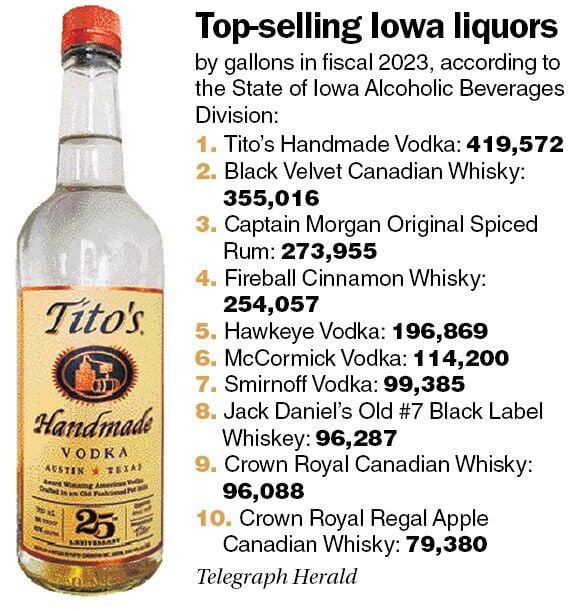Over the past year, Iowa retailers purchased enough Tito’s Handmade Vodka to fill Dubuque’s Flora Pool and still have about 20,000 gallons left over.
And as consumers opened their wallets for their drinks of choice, a trend continued to emerge: Cocktails are king.
Iowans’ thirst pushed the state’s distilled-spirit sales for the fiscal year that ended June 30 into the record books. In fiscal year 2023, liquor sales to retailers totaled $445,830,313, according to the Iowa Alcoholic Beverages Division’s annual report. Those sales — along with license fees, a wine tax, bottle deposits and other charges — translated to record revenue of more than $491 million, marking a 2.1% increase from fiscal year 2022.
The Alcoholic Beverages Division is the wholesaler of liquor for the state and supplies spirits to class E liquor-license holders, the majority of which are convenience stores, grocery stories and liquor stores. Those establishments sell the liquor products to the public.
State data shows that while the amount of money spent on liquor increased, the volume sold decreased slightly from 6.47 million gallons to 6.37 million gallons.
Stephen Larson, administrator for the Alcoholic Beverages Division, said those sales numbers represented a return on investment for Iowans in fiscal year 2023, as profits were put into the state’s general fund.
“The sales growth generated a net profit of $117.1 million, which will be used to support essential state programs and services,” Larson said in the report.
There were 59 businesses in Dubuque County with class E licenses as of June 30, 19 more than at the conclusion of the 2022 fiscal year. That growth is mirrored across the rest of the state as well, including a total of 18 such businesses in Clayton County, 13 in Jackson County and 10 in Delaware County.
Total sales to Dubuque County class-E-liquor-license holders ranked 10th in the state in fiscal year 2023, the same as the county’s ranking in fiscal year 2022. Sales in fiscal year 2023 totaled over $12 million.
Vodka, whiskey popular
For the second year running, Tito’s Handmade Vodka reigned supreme as the top-selling spirit in Iowa, with just under 420,000 gallons purchased by Iowa retailers.
Also for the second year in a row, Black Velvet Canadian Whisky was runner-up in sales, with over 355,000 gallons sold to Iowa retailers. Rounding out the top five were Captain Morgan Original Spiced Rum, Fireball Cinnamon Whisky and Hawkeye Vodka.
All distilled spirits among the top 10 in sales were from national distributors, but 11th-place Blue Ox Vodka, of which 76,312 gallons were sold in Iowa, is based in Des Moines.
Of the top 10 spirits, four were vodkas and five were different whiskey varieties.
“Tito’s has completely taken over the vodka market,” said Scott Huff, manager at Sid’s Beverage Store in Dubuque. “In all the years I’ve worked (at Sid’s), I’ve never seen a booze come onto the scene and take over within a decade like this. … At this rate, brands like Smirnoff and Absolut are going to be gone by the wayside.”
Sales of Mixed drinks rise
Huff said Tito’s charitable donations have drawn people to the brand — but a growing love for mixed drinks and cocktails has pushed sales numbers skyward.
“Tito’s is our most popular vodka by far,” said Dubuque Mining Co. manager Robert Shaw. “Everyone loves Tito’s. You get Tito’s and lemonade and it just hits right.”
Huff said people who were forced to stay at home during the COVID-19 pandemic began making their own mixed drinks — a taste that continues today, both at home as well at local establishments.
“Cocktails are king,” Huff said. “They’re back, especially ones that have been around for close to 100 years (including) old fashioneds and Manhattans. You can’t go to a restaurant in Dubuque and not see that on the menu. Five years ago, that wasn’t the case.”
Social media also fuels mixed-drink desires.
“TikTok is one of the biggest trend-setters in drinks,” Huff said. “We get five people a day wanting to make a cocktail they saw on TikTok. … People are willing to pay top dollar for craft cocktails.”
Shaw said the number of customers purchasing non-alcoholic beer is ticking upward, as well.
The number of gallons of alcohol-included beer and wine sold decreased by 3.3% and 6.1%, respectively, in fiscal year 2023, according to the report. The state does not maintain data tracking brand preferences.


